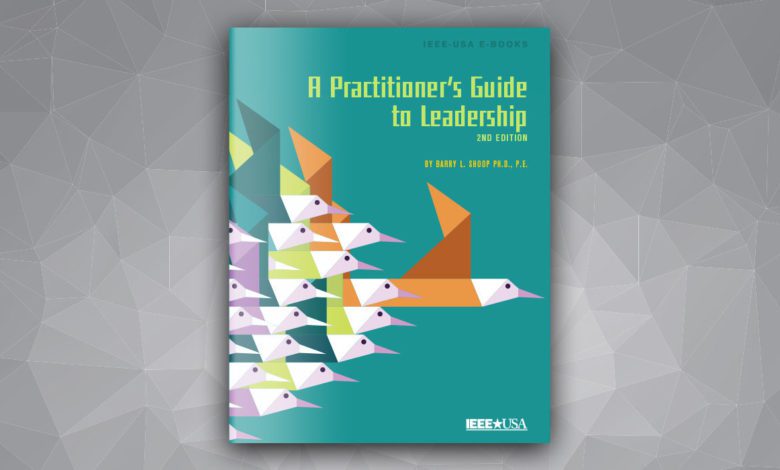
Drawing on his broad range of engineering and military experience, as well as his leadership role at IEEE, Barry L. Shoop Ph.D., has authored a new edition of A Practitioner’s Guide to Leadership. The new edition includes many of the core ideas of his original work; however, Shoop adds insights gained since the first edition (published in 2008) — including those drawn from his time as IEEE President and CEO. Shoop believes that anyone can become an effective leader through “self-study, education, training, experience and reflection.”
This book is a great way to kickstart your leadership journey, or to help you identify your next leadership move. A Practitioner’s Guide to Leadership – 2nd Edition, a lengthy e-book of nearly 50 pages, with many valuable resources and references, is available free to IEEE members at IEEE-USA’s online shop. Non-members pay $19.99.
As in the first edition, Shoop discusses principles of leadership, leadership traits, building teams — and key differences between leaders and managers. In this second edition, he adds his views on the need for an expanded portfolio of skills for the modern leader; more depth on leadership theories; and a new section on a leader’s role, in a world dealing with global environmental issues.
Shoop does not believe that leaders are born. While some individuals may possess traits that lead them to leadership, while others are propelled to leadership by a crisis; the author holds that most leaders result from an individual’s conscious decision to become a leader. He writes that people can learn to be leaders through regular reflection, and by actively developing leadership skills — not just to be a boss, but to lead a team — or a company. Shoop sums this theory up in his introduction: “Leadership is something that you should consider and foster, early and often — throughout your entire professional career.”
In the book, Shoop makes a clear distinction between a leader and a manager: a leader is one who is followed; the manager is one who controls or administers a part of a business. He cites several key differences between managers and leaders as outlined in Warren Bennis’s book On Becoming a Leader, such as — a manager asks how and when, while the leader asks what and why. The author also outlines 11 principles of leadership that flow from concentrating on who you are (beliefs and character), what you know (job and tasks), and what you do (motivating and providing direction).
In building a team, Shoop warns against developing a team of “yes-people.” Further, he writes a leader should ensure that teams are diverse in thought as well as reflective of the diversity of key stakeholder groups, to foster innovative thinking. Of course, leading a diverse team means a leader must understand the different people who make up the team, and what motivates them. The author gives a good overview of the Myers-Briggs Type Indicator, recommending leaders seek to understand the different personality types — to better communicate with each, and to foster cooperation and collaboration within the group.
A critical skill for any leader is running effective and impactful meetings. Shoop outlines what people look for in effective meetings, as well as the characteristics of negative ones. He looks at the supportive roles that participants can play (the clarifier, the tester, the summarizer, etc.), as well as the disruptive roles (the blocker, the dominator, the topic jumper, etc.). The author argues that a good leader must understand these different roles, and how (and when) to deal with them. He also gives practical advice on the logistics of good meetings — from understanding and defining the purpose of the meeting, to tracking attendees’ expectations after the meeting.
Shoop’s new section on the environment paints a stark picture of the challenges facing the world: climate change, deforestation, decline in biodiversity, and the earth reaching a population of one billion in 2030 — with increasing demands for food, water, energy and infrastructure. The author concludes, “Understanding these and other external environmental trends, and how they can potentially impact the organizations in which we lead, is an increasingly important skill for leaders.”
This book is not just for a CEO (though many might benefit from it), but its contents give insight and practical guidance — no matter where you are on your leadership journey.
Barry L. Shoop, PH.D., P.E., is the Dean of Engineering at the Albert Nerken School of Engineering, The Cooper Union. He served in the U.S. Army for 39 years, ending as that career as a Brigadier General. He regularly lectures on leadership and the changing face of leadership, including regularly presenting on leadership for IEEE’s Volunteer Leadership Training (VoLT) Program. Shoop created an IEEE Expert Now course, An Introduction to Leadership: A Primer for the Practitioner — the most accessed module in the IEEE Center for Leadership Excellence (CLE) Learning Library. In 2016, he was IEEE President and CEO. And Shoop is a recipient of IEEE’s Haraden Pratt Award for outstanding service to the organization.
Paul Lief Rosengren is the coauthor of In the Time of Covid: One Hospital’s Struggles and Triumphs which received a 2021 Best Independent Book Award in the medical category and Hedy Lamarr — Inventor Extraordinaire and Hollywood Star, published by IEEE. He has a Master’s in Public Policy from The Kennedy School of Government, Harvard and an undergraduate degree in political science from Dickinson College.







